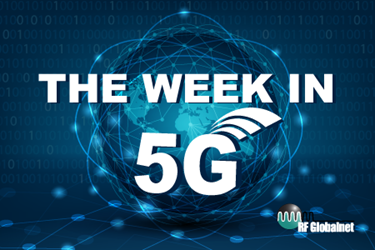The Week in 5G: 6/18/2019 — Huawei Feeling Sting of U.S. Ban, SK Telecom Inks "Smart Power Plant" Deal, Qualcomm Flexes 5G Muscle
By Ed Biller

Japan appears to have found a solution to a common 5G rollout problem: a lack of suitable locations for new base stations, since 5G networks require more relay spots than 4G services, and existing base stations already house equipment for current services. Japan Times reports that the Japanese government approved last week a project to install 5G wireless relay devices on traffic signals across the country. The goal is to deploy new 5G equipment on 208,000 such signals by April 2026.
Also last week, SK Telecom announced a collaboration with Korea Hydro & Nuclear Power to develop “5G-based smart power plant solutions,” reports ZDNet. The report states that the nation’s largest telco and the energy company “will co-develop 5G smart factory solutions that increase energy production efficiency and improve on and off-line security.”
From power to money, Bank of Santander and Telefónica have partnered to apply 5G to banking, trialing the initiative at two banks in Alcobendas, Spain. The partners claim this pair of banks is the first connected by 5G technology in Europe, reports Mobile Europe. Use cases will include 4K video-conferencing between the offices, 5G cloud storage, and “virtual visit to co-working spaces.”
China’s Huawei, meanwhile, appears to be suffering some ill effects resultant of the U.S. government’s effective ban on its equipment due to security concerns. While the telco was expected to surpass Samsung this year as the world’s largest cell phone manufacturer — it shipped more phones than Apple last year — Shao Yang, Chief Strategy Officer of Huawei's consumer business, said last week the company is unlikely to achieve that goal in 2019, though he did not state the reason. Further, Huawei founder and CEO Ren Zhengfei said Monday that the telco’s revenue will fall $30B short of forecasts over the next two years, directly attributing the numbers walkback to U.S. government actions.
Compounding these concerns is the revelation that Huawei’s foldable Mate X phone will be delayed by several months, reports CNN; this after that Samsung’s Galaxy Fold was panned by reviewers due to defective hinges and broken screens.
Still, Samsung has cause for optimism.
Beginning June 21, 2019, Sprint will offer the Samsung Galaxy S10 5G to operate within Sprint's True Mobile 5G network, the company announced last week. The Galaxy S10 5G — the third 5G device Sprint has made or will make available — will first be available to customers in the telco’s first four 5G markets (Atlanta, Dallas, Houston, and Kansas City), and will become available in Sprint’s other 5G markets (Chicago, Los Angeles, New York City, Phoenix and Washington, D.C ) within a few weeks.
In other technology news, Forbes last week assessed mobile 5G chipsets and declared Qualcomm the undisputed global leader right now, reasoning that the company currently is shipping two generations of 5G modems to customers, operates in both sub-6 GHz and mmWave commercially, and offers “numerous 5G front-end products in addition to its 5G modems.”
Still, Qualcomm Senior VP of Spectrum Strategy and Technology PolicyDave Brenner told VentureBeat last week that he isn’t interested in “winning” the “race to 5G,” so to speak. He called the “race” a flawed premise, because “it implies an ordering that if you’re not first, you’re out of luck, you’re somehow inferior, you’ve done something wrong. We’re not trying to have just one winner around the world; we want everyone to sail through the tape as a winner.”
“If it’s a race, it’s more of a perpetual race,” Brenner continued. “It doesn’t have a starting point and an end date.”
Qualcomm’s clear-cut leadership has been an issue for some companies dependent on its chipsets — most notably Apple, which tried to defect to Intel chips before retreating back to Qualcomm in the form of a $4.5B settlement. Most recently, though, LG Electronics is on shaky ground with Qualcomm, as the interim licensing deal inked by the two companies last year is set to expire later in June, and negotiations on extending or re-working the contact have stalled, reports Business Insider.
Meanwhile, The Information reports that Apple is working to part of Intel’s smartphone modem business. The report states that Intel wishes to piece out its global modem business, and Apple is interested in buying the German operations center, “where Infineon, whose modem operations Intel bought in 2011 for $1.4 billion, is based.” Apple intends to build its own 5G chip that will be ready for iPhones in 2022 or 2023, adds a CNBC report.
The CNBC report also states that Apple aims to release three new iPhones in 2020, two of which will be 5G capable, and both of those will use Qualcomm chips.
In regulatory news, Germany recently completed its 5G auction for 2 GHz and 3.6 GHz mobile spectrum, announced the nation’s Federal Network Agency, Bundesnetzagentur. After 52 days and 497 rounds of bidding, Deutsche Telekom invested €2.2B for 130 megahertz of spectrum in both 5G bands; Vodafone spent €1.9B on 130 megahertz of 5G spectrum; Telefonica Deutschland committed €1.4 billion for a 90 megahertz of spectrum; and 1&1 Drillisch entered the fray with €1.1 billion spent on 70 megahertz of 5G spectrum.
RCR Wireless News reports the German government will raise a total of €6.5B ($7.31 billion) for 420 megahertz of 5G spectrum. This figure was met with grumbling by some of the bidders, who complained that the exorbitant cost of spectrum in Germany exceeds that of other nations, as well as inhibits their ability to spend capital expanding their networks.
